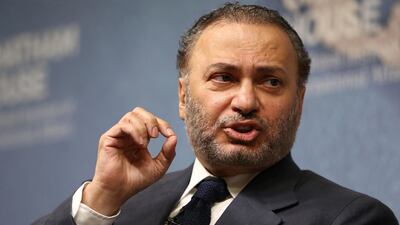Qatar has announced changes to its anti-terror legislation that the UAE has called "a step in the right direction" towards addressing the concerns of its neighbours.
The move comes nearly eight weeks into a boycott of Qatar by the UAE, Saudi Arabia, Bahrain and Egypt over its support for terrorism and extremism.
A decree issued on Thursday by the Qatari emir, Sheikh Tamim bin Hamad Al Thani, establishes two national lists for individuals and terrorist entities and sets out the requirements for being included on them.
"The Qatari decision to revise their law regarding the financing of terrorism is a step in the right direction towards addressing the terrorism blacklist of 59 entities. The pressure from the crisis has borne fruit," Dr Anwar Gargash, Minister of State for Foreign Affairs, said on Twitter on Friday.
The 2004 legislation was also amended to define what constitutes terrorists, terrorist crimes, terrorist entities as well as the financing of terrorism.
The Qatari move also comes a little over a week after it signed an agreement with the United States to combat the financing of terror.
That deal was signed during a visit to the Gulf by US secretary of state Rex Tillerson in an attempt to mediate a resolution to the dispute between Qatar and Saudi Arabia, the UAE, Bahrain and Egypt.
Mr Tillerson also voiced optimism about Qatar's terror-law amendments on Friday, telling reporters in Washington that the US was “satisfied with the effort” Doha was making and urging its neighbors to consider restoring land links "as a sign of good faith".
Asked about the amendments that Qatar has announced to its counterterrorism law, Katherine Bauer, a fellow at The Washington Institute for Near East Policy and a former US Treasury official told The National, “it appears they will enable Qatar to establish a national terrorist list.”
Ms. Bauer who served as a financial attaché to the Gulf while at Treasury noted “that the key will be for Qatar to populate the list by designating terrorist organisations, as well as individuals and entities that support them.”
“It will also be important for Qatari authorities to make clear the criteria for such listings and the process for delisting, as well as to publicly communicate designations both from a due process perspective, but also to promote compliance by the broader public with restrictions on dealing with designated entities,” Ms. Bauer said.
The four countries cut diplomatic and all travel links with Doha on June 5 and days later issued a terrorism blacklist of 59 individuals and 12 entities either based in or related to Qatar.
They had welcomed the US-Qatar agreement but said it did not go far enough towards addressing their concerns about Doha's destabilising behaviour in the region.
"Diplomacy must address Qatar's support for extremism & terrorism & undermining regional stability. A temporary solution is not a wise one," Dr Gargash said on Twitter after the accord was signed.
Although details of the agreement have not been made public, sources have said it provides for the United States to post two officials at Qatar's state prosecutor's office.
"They will work hand in hand with Qatar to charge individuals accused of financing terrorists," a Western official in the Gulf who has seen the document told Reuters.
The agreement specifies actions Qatar will take by the end of the year, including imposing travel bans, enforcing surveillance, and freezing the assets of individuals with suspected links to terrorism, the official said. The accord points to internationally agreed definitions of terrorism without specifying particular groups.
A US department of justice spokesman declined to comment.

